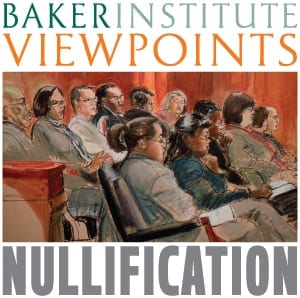No matter what the evidence, a jury is empowered to acquit, and no judge can take that authority from them. At some point, should they believe a conviction would be unjust, American jurors are empowered to exercise their prerogative to “just say no” — and occasionally, they do just that. Under alcohol prohibition, such acquittals made Prohibition unsustainable; the law that could never be repealed was repealed, because public opinion made it unenforceable. The ban on marijuana — another law that it sometimes seems can never be repealed — is just as vulnerable to the judgment of American jurors. Continue Reading →



